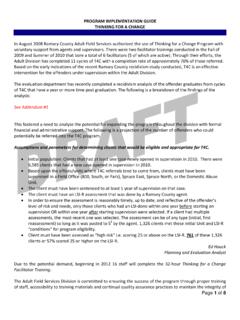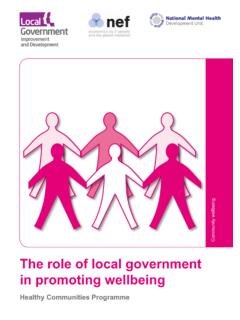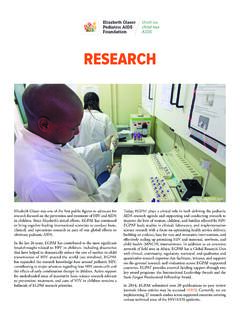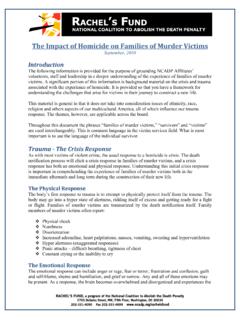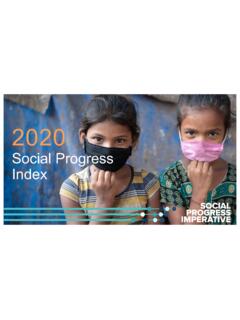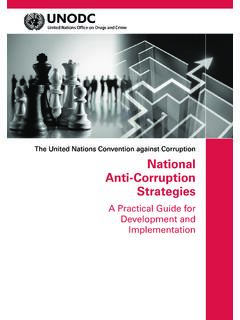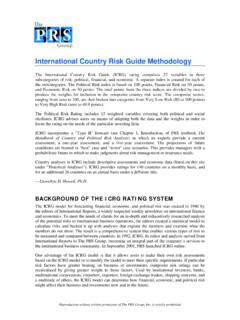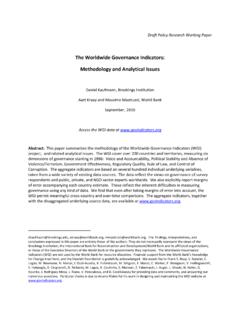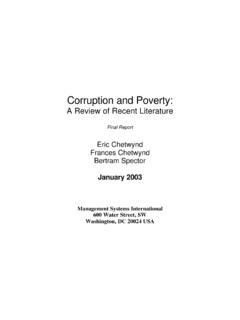Transcription of THE HAPPY PLANET INDEX
1 THE HAPPY PLANET INDEX An INDEX of human well-being and environmental impactnef is an independent think-and-do tank that inspires and demonstrates real economic well-being. We aim to improve quality of life by promoting innovative solutions that challenge mainstream thinking on economic, environmental and social issues. We work in partnership and put people and the PLANET first. nef (the new economics foundation) is a registered charity founded in 1986 by the leaders of The Other Economic Summit (TOES), which forced issues such as international debt onto the agenda of the G7/G8 summit meetings. It has taken a lead in helping establish new coalitions and organisations such as the Jubilee 2000 debt campaign; the Ethical Trading Initiative; the UK Social Investment Forum; and new ways to measure social and economic well-being.
2 Contents Executive summary 2 Introduction 6 What is the ultimate aim of societies? 6 Introducing the HAPPY PLANET INDEX 8 Why do we need a new INDEX ? Existing measures and their limitations 8 Components of the HPI 10 Calculating the HPI 14 Interpreting the HAPPY PLANET INDEX 15 Different types of progress: HPI vs. existing indicators 22 Development blues: the Transition Countries and Southern Africa 24 Island paradise 30 Factors influencing well-being 31 Cultural values 31 Political conditions 32 Social Capital 33 We are accustomed to comparing countries in terms of crude riches or what they trade. Some countries earn, or are given, reputations for music, sporting excellence, food, or as holiday destinations. There are international league tables for performance on a range of issues from corruption to football.
3 This report introduces a measure of something more fundamental. It addresses the relative success or failure of countries in supporting a good life for their citizens, whilst respecting the environmental resource limits upon which all our lives depend. The HAPPY PLANET INDEX (HPI) is an innovative new measure that shows the ecological efficiency with which human well-being is delivered. Countries at the top of the HPI 35 Countries at the bottom of the HPI 37 Conclusion: Does happiness have to cost the Earth? 39 A Global Manifesto for a happier PLANET 41 Where do we go from here? The HPI and implications for policy 41 Appendix 1: Data limitations 45 Appendix 2: Data sources and estimation procedures 48 Appendix 3: Calculating the HPI (details) 51 Endnotes 53 Executive summary This report takes a very different look at the wealth and poverty of nations.
4 It measures the ecological efficiency with which, country by country, people achieve long and HAPPY lives. In doing so, it strips our view of the economy back to its absolute basics: what goes in (natural resources), and what comes out (human lives of differing length and happiness). We are accustomed to comparing countries in terms of crude riches or what they trade. Some countries earn, or are given, reputations for music, sporting excellence, food, or as holiday destinations. There are international league tables for performance on a range of issues from corruption to football. This report introduces a measure of something more fundamental. It addresses the relative success or failure of countries in supporting a good life for their citizens, whilst respecting the environmental resource limits upon which all our lives depend.
5 The HAPPY PLANET INDEX (HPI) is an innovative new measure that shows the ecological efficiency with which human well-being is delivered. It differs markedly from the central indicator of national income usually referred to by commentators, and relied on by governments to measure their success Gross Domestic Product (GDP). And it also has a different rationale to the various alternative indicators that begin with GDP, and then subtract social and environmental costs to create a more accurate measure of economic success. Some will view the report s findings with surprise, or even shock. The order of countries may seem counter-intuitive. But this is because, to a large degree, policy-makers have been led astray by abstract mathematical models of the economy that bear little relation to people s day-to-day realities.
6 By returning to first principles and assessing the relationship between the fundamental inputs and the ultimate ends of society we are attempting to rectify this costly oversight. No single country in our INDEX has everything right. We have to acknowledge from the start that while some countries are more efficient than others at delivering long, HAPPY lives for their people, every country has its problems and no country performs as well as it could (hence this could be regarded as an unHappy PLANET INDEX ). Yet, fascinatingly, it is possible to see patterns emerging that point to how we might better achieve long and HAPPY lives for all, whilst living within our environmental means. Islands perform well. Perhaps a more acute awareness of environmental limits has sometimes helped their societies to bond better and to adapt to get more from less.
7 Combined with the enhanced well-being that stems from close contact with nature, the world as a whole stands to learn much from the experience of islands. The challenge will be whether we can learn the lessons of the HPI and apply them. The INDEX is built from three different indicators, two of which are objective: life expectancy and the ecological footprint a measure of our use of environmental goods and services. The third indicator is people s subjective well-being, or life satisfaction . (It should be noted that the way people report their life satisfaction corresponds to objective facts such as their mental and physical health.) The HAPPY PLANET INDEX 2 Any INDEX is only as good as the data that feed it and no data set is perfect, even those relied on by governments, central banks and international financial institutions.
8 Wherever possible we have used the best available official statistics the same as those used by policy-makers and we are confident that there is much to learn from what they show, however surprising it may be. Some of the most interesting findings concern the marked differences between nations. For example: P It is possible to live long, HAPPY lives with a much smaller environmental impact. Our INDEX reveals a striking comparison between the United States and Germany. People s sense of life satisfaction is almost identical in the two countries and life expectancy is broadly similar, although the average German can expect to live a little longer than the average American. But Germany s ecological footprint is only about half that of the US Germany is around twice as efficient as the US at generating long, HAPPY lives in terms of the resources that it consumes.
9 P Countries with the same ecological footprint can produce lives of greatly differing length and well-being. Russia and Japan show that the opposite is also possible. These two countries have an almost identical ecological footprint, but their respective average life expectancy and life satisfaction differ radically. Born in Japan you can expect to live nearly 17 years longer than if you are born in Russia, and you are likely to report a level of life satisfaction nearly 50 per cent higher than the average Russian. A similar picture emerges if Jamaica and Equatorial Guinea are compared. Virtually identical ecological footprints contrast with the fact that Jamaicans will live, on average, 27 years longer and be much happier. P Countries similar in other ways can differ enormously in life satisfaction.
10 Comparing another two countries reveals an even more complicated picture. Moldova and Honduras are ranked next to each other in the United Nations well-regarded Human Development INDEX (HDI). They have similar life expectancy and similar ecological footprints. But, even allowing for variance in data, their life satisfaction levels are radically different. Hondurans report levels of life satisfaction over twice those reported by Moldovans. The latter are really quite unhappy. P Island nations score well above average in the INDEX . They have higher life satisfaction, higher life expectancy and marginally lower ecological footprints than other states. Yet their incomes (in GDP per capita terms) are roughly equal to the world average. Even within regions, islands do well. Malta tops the Western world with Cyprus in seventh place (out of 24); the top five nations in Africa are all islands; as well as two of the top four in Asia.
